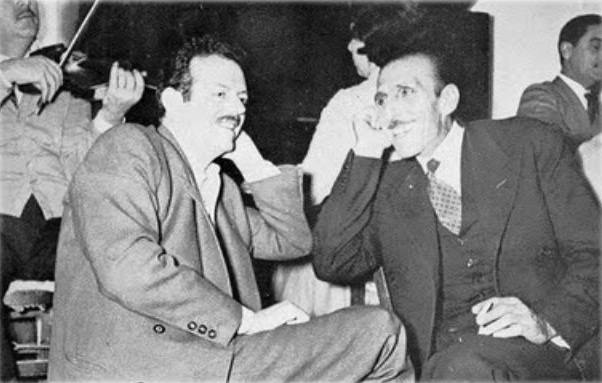<Back to Index>
- Songwriter Manolis Chiotis (Μανώλης Χιώτης), 1920
- Songwriter Yiannis Papaioannou (Γιάννης Παπαϊωάννου), 1913
PAGE SPONSOR
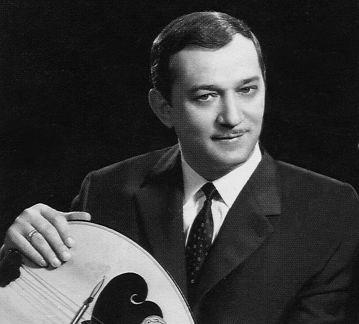
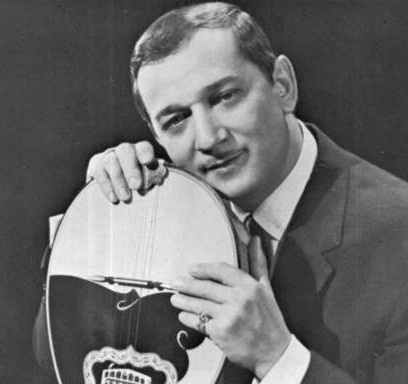
Manolis Chiotis (Greek: Μανώλης Χιώτης) was a Greek rebetiko and laiko composer, singer and bouzouki player. He was born on March 21, 1920 in Thessaloniki and died in 1970. He is considered one of the greatest bouzouki soloists of all time. He invented the four - string bouzouki (tetrachordo) and introduced the guitar - like tuning, founding it better suited to the kind of virtuoso playing he was famous for.
Chiotis was born on March 21, 1920 in Thessaloniki. His father was Diamantis Chiotis, born in Piraeus. From an early age he got involved with traditional musical instruments and started learning the guitar under a musician at Thessaloniki and, subsequently, the bouzouki and the oud. When he was 15, his family moved to Nafplio, where he started working as a musician professionally.
At around 1935, he came to Athens to study the violin, and met Stratos Payoumtzis, who hired him to play the bouzouki in his band at the venue ``Dasos" (``Woods") in Votanikos. In 1937, he recorded his first rebetiko ``To chrima den to logariazo" (``I am not counting the money"), which became an immediate success. Up to and, then, after the war he continued writing and composing songs. However, having realized that, using the classical bouzouki made it difficult to perform faster rhythms, he added a fourth string to the instrument, thus creating the 4-string bouzouki. The extra string widened the potential of the instrument, allowing for much faster playing as compared to the traditional bouzouki.
Meanwhile,
in the 1950's he pioneered the use of amplification while playing a
traditional instrument. Thus, the archontorebetiko period was initiated,
during which the bouzouki entered the upper middle class entertainment
venues. For this more affluent public Chiotis composed songs in latin
American style, mainly based on the Mambo. This innovation strengthened
further his reputation as a leader of a novel music tradition based on
the rebetiko and the laiko. The press dubbed him the ``leader of the
bouzouki in the salons".
The
first venue that he himself founded after the war was the club
``Pigals", the first ``cosmopolitan club" in Athens. From the late 50's
he started performing at the club ``Spilia" ("Cave") or ``Paraskeva's
Cave" in Piraeus.
In 1960's Chiotis was listed in a special list by the Ministry of Foreign Affairs for the entertainment of foreign dignitaries
visiting the country. He did perform for many Leaders and Heads of
State and was even invited to perform at the White House for the
Birthday of President Lyndon Johnson. At that visit, when Jimi Hendrix
listened to a bouzouki solo of extraordinary speed and dexterity, he
called Chiotis the ``greatest virtuoso of the bouzouki in the World".
To Chiotis are attributed
more than 1500 songs. But he was also a soloist in the recording of
songs by many other composers. Mikis Theodorakis trusted his virtuosity
in his first official recording of ``Epitafios" by Yannis Ritsos, and
their collaboration was continued with ``Lipotachtes", ``Archipelagos",
etc. He also collaborated at around the same time with Manos
Chatzidakis.
His
greatest hits were recorded with Mary Linda, who was his second wife
for a decade and with whom he made a cinematic appearance. He was
married three times. His first wife was the, then, 14 years old Zoe
Nachi. They had two children together. In 1958 he married Mary Linda.
This marriage was full of successes in both of their careers, but ended
unexpectedly in 1967-68. He finally married Beba Kyriakidou with whom he
stayed until the end of his life.
Chiotis died suddenly of a heart ailment at the Hippocrates Hospital in Athens during the early mourning hours on his Birthday March 21, 1970. The news caused an outpouring of sorrow all over Greece. Public radio and TV stations broadcast special programs and all local daily newspapers praised his contributions to the Greek traditional music and cultural scene.
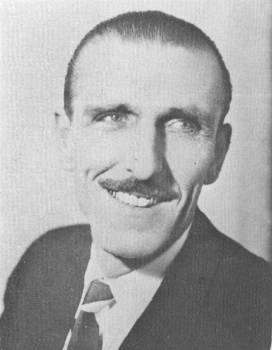
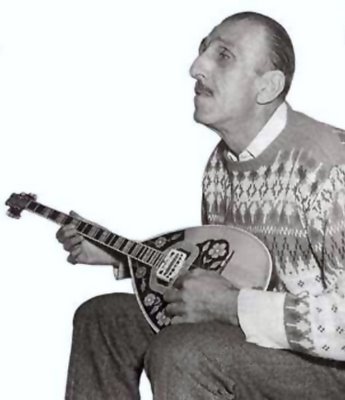
Giannis Papaioannou (Greek: Γιάννης Παπαϊωάννου; January 18, 1913 – August 3, 1972) was a famous Greek musician and composer born in Kios, Turkey (now Gemlik). In English his name is sometimes romanized as Yannis, Ioannis or Yiannis. Most active in the 1940s, he wrote many songs, some of which are today considered classics of the rebetiko folk music style. These include: Pente Ellines Ston Adi, Kapetan Andreas Zeppo, Modistroula, Prin To Charama Monachos, and Fovamai Mi Se Chaso. His style retains much of the musical quality of the classical rebetika of the likes of Markos Vamvakaris, although the thematic content of the lyrics tends not to focus as much on the typically dark topics – drugs, death and prison – of earlier rebetika.
He died on August 3, 1972 in a road accident and was buried in a cemetery in Kallithea, just southwest of Athens, near the Tzitzifies area of south Kallithea, where he, like many other rebetiko and laiko musicians, would frequently perform.
